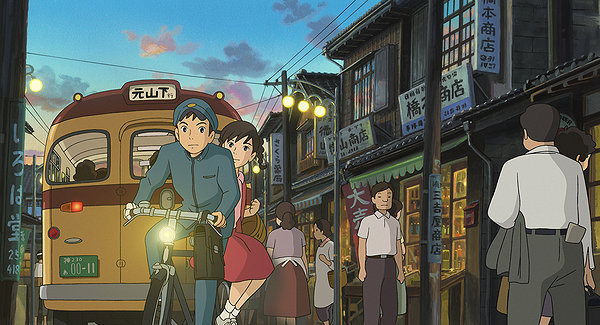Review: From Up On Poppy Hill (2013)
One of the recurring themes in the films of Studio Ghibli – and central to From Up On Poppy Hill, recently released in North America after its 2011 release in Japan – is the push and pull between the past and the future. This is embodied in the very fact that the studio continues to make hand-drawn animated films while utilizing computer effects and compositing sparingly. Furthermore, that studio co-founder Hayao Miyazaki’s son, Goro Miyazaki, directs From Up On Poppy Hill makes the film’s interest in connection to the past explicit and looks ahead to the future of the studio. This film continues Ghibli's legacy with warmth, humour, and real human drama.
It is 1963, the year before the Tokyo Summer Olympics, and the country's citizens are working hard to prepare their country for their first postwar showcase as a democratic nation. In Yokohama, just down Tokyo Bay, Umi Matsuzaki lives with her grandmother and sister and brother, helping the family run a boarding house on Poppy Hill while the her mother studies in America. Umi’s father, a merchant seaman, is presumed killed in the Korean War when his ship hit a mine. Each morning Umi raises nautical flags in the yard on the hill, in the faint hope that her father might see them.
At Umi’s high school a section of student body is working hard to save the Latin Quarter, a dirty, run-down old clubhouse, from demolition. The leaders of the student movement argue that the Latin Quarter represents their connection to the past, and that to bulldoze it in the march of modernity and progress would be to lose sight of who they are as people. Umi gets involved in the campaign at the behest of Shun, a passionate and politically minded young man who takes to Umi’s suggestions that they clean the Latin Quarter up in order to swing popular opinion back to their side. Umi suspects that Shun published a poem in the school newspaper replying to the flags that she puts up each morning, and they begin a tentative romance.
From Up On Poppy Hill is at heart a teenage melodrama, of a piece with earlier Studio Ghibli films such as Whisper of the Heart. Of course the budding romance between Umi and Shun meets against complications, which can only be overcome by finding out more from the older generation about their own family pasts. The film’s theme of the importance of connection to the past is thus woven into the film’s plot turns and twists. But it also raises the question about the responsibility of earlier generations in preserving a legacy for the future, something that is mirrored in the background context of 60s Japanese political strife; the postwar generation had to balance distancing themselves from their nationalistic and imperialist past while maintaining their identity as Japanese. While the young protagonists both maintain the Ghibli propensity for portraying characters full of perseverance, who work hard, and maintain a good natured faith in possibilities, the challenges they face are real, and favourable outcomes are not assured. Given a bit of bad timing or luck, and the work of a generation can come crashing down.
Studio Ghibli’s dedication to producing films in genres that aren’t often given animated treatment – in this case a period-piece, teenage melodrama – is to their credit. The realization of 60s Japan would be much more difficult to realize in live-action, and without a significant budget the camera wouldn’t have the freedom it does here. Goro Miyazaki and his team maintain the high level of quality that audiences have come to expect from Ghibli; one of the film’s true pleasures is the attention to everyday detail that is rendered, from Umi’s preparations for meals to the over-stuffed and rickety Latin Quarter building. The film’s slower pace allows for the viewer to engage in an enjoyment of the images on the screen, without feeling hurried.
From Up On Poppy Hill is one of this year’s movie going treasures thus far. While at times it seems a bit too on the nose thematically, the film reaches a depth that is rare in films ostensibly aimed at teenagers these days. It recalls instead films of the 60s where the actions of the youth and the legacy they will protect or leave seemed to have real stakes. As one character comments, “Get rid of the old, make way for the new.” Studio Ghibli respects the craftsmanship of the past, without rejecting the spirit of youth that provides us with our future.
8 out of 10
From Up On Poppy Hill (Kokuriko-zaka kara) (Japan 2011; US dub 2013)
Directed by Goro Miyazaki; screenplay by Hayao Miyazaki & Keiko Niwa based on a story by Tetsurô Sayama; featuring the voices of Sarah Bolger, Anton Yelchin, Gillian Anderson, Christina Hendricks, Aubrey Plaza, Jamie Lee Curtis, Bruce Dern.
